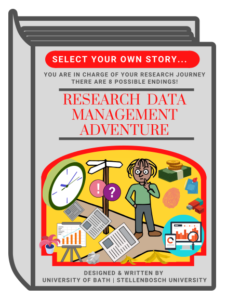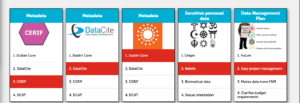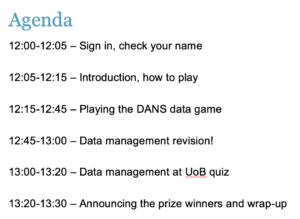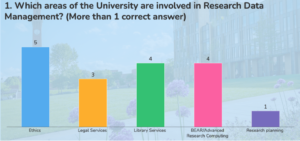It had been a while since we had run a Digital Research Conversations (DRC) event, partly due to the pandemic but also as we had no less than 26 of our BEAR users speaking at the BEAR Conference in September. Thanks to the hard work of the PGR organising Committee, the Conference moved from being an in-person event in June to a highly successful online event (recordings available here). For this DRC, we wanted to provide an opportunity for a more informal get together whilst still learning about data management.
 We therefore decided to run an online Data Game & Quiz based on the DANS data game, which has been converted from a card format to online and made fully available for others to use. The first version took an hour to complete so I was glad to hear about a shorter version being available when I attended part of the Research Support Games Day 2. Through their comprehensive list of games I also heard about this excellent Research Data Management Adventure game which takes you through the steps of being a researcher and managing your data with some severe consequences for mis-management! There is also a Data Management Escape room which would make a great interactive session – I found out about it too late to run it this time though.
We therefore decided to run an online Data Game & Quiz based on the DANS data game, which has been converted from a card format to online and made fully available for others to use. The first version took an hour to complete so I was glad to hear about a shorter version being available when I attended part of the Research Support Games Day 2. Through their comprehensive list of games I also heard about this excellent Research Data Management Adventure game which takes you through the steps of being a researcher and managing your data with some severe consequences for mis-management! There is also a Data Management Escape room which would make a great interactive session – I found out about it too late to run it this time though.
The DANS data game is similar to Happy Families in that you have to collect groups of cards (quartets) – each quartet is related to a different aspect of data management such as Data Management Plans, sharing data and causes of data loss. Only half of the quartets were in the shorter version of the game but these seemed to include the key topics of data management with the exception of sensitive data, which is a common area we get asked for help with.

The physical card game has descriptions of each of the card titles so you can learn about each different aspect of data management. Unfortunately, there is not space on the online version for the detail, so I decided to highlight the key points in a Powerpoint presentation afterwards to provide some ‘revision’ time and then have a quiz based on the cards. There is a helpful pdf available here which lists all the cards and their descriptions. The quiz also allowed us to customise the information to data management at the University of Birmingham. As we were limited to 15 minutes for the ‘revision time’ we did a Zoom poll to see which topics were of most interest or attendees needed to learn more about. We then focused on the top 5 areas which were (in no particular order): ‘Ways to publish data’, ‘Data Management Plans’, ‘FAIR – encouraging reuse of data’, ‘RDM in 4 steps’ and ‘Why share data’.

It was originally planned to run the DANS data game in Zoom breakout rooms (each game needs 3-4 players) but with the small numbers attending we decided to keep everyone in the main session. This also made it easier to communicate with everyone as we couldn’t find an easy way for breakout room attendees to communicate with the hosts in the main session if there was a problem. We had to stop running the game after 30 minutes and the games hadn’t finished by that point. There were some players with more quartets than others but it would have been difficult to pick a winner just from the game.
After the revision section it was then onto the quiz with 18 questions covering several areas of data management (quiz questions can be viewed here). The quiz was run through Aha Slides as the free version allowed for unlimited quiz questions, unlike some other interactive session providers. It was also very easy to use, however you need to pay a small amount (currently $2.95 for 15 people) to make it available to more than 7 people. The quiz was also important as we needed a winner for our prizes. Whilst it was easy to think of questions for the quiz, it was hard to think of incorrect answers that weren’t too obvious!

We overran slightly on time as the quiz took a bit longer than expected – too much time had been allocated to answer some questions. However, feedback from the participants was good with everyone responding that they had learnt lots about managing their data from the session and they appreciated the opportunity to meet new people whilst being stuck at home. They also seemed pleased with the delivery of the session but would have preferred it to be in person if it had been possible. With hindsight, it would have been better to not have so many leaderboards (one after each question) as those not doing so well may have felt disheartened.
We were very thankful to Lenovo for providing our star prize of a tablet which our winner was very pleased to receive – they plan to use it when running coding workshops at their local library when it is allowed again! It definitely helped to have a prize to attract people to register for the event – particularly postgraduate research students.
Overall, I think the session went well. The availability of all the online research support games is excellent at the moment, with new one’s becoming available all the time and they can be a great way to engage with researchers remotely on data management.
Further Information
University of Birmingham researchers can sign up to our Digital Research Conversations Canvas course to find slides and summaries of our series of DRC events: https://canvas.bham.ac.uk/enroll/Y7C7LY
